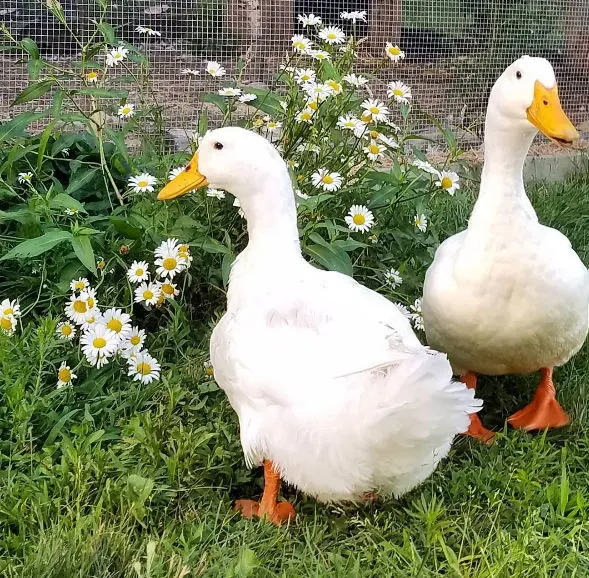5 Reasons Why you Need to Raise Ducks
If you've been considering raising some ducks in your backyard, either stand-alone or alongside your chickens, I'm here to tell you that you won't regret it.
Raising ducks is the same as raising chickens, only different.
We've been raising chickens and ducks together since the very beginning - we brought six baby chicks and two ducklings home from the feed store that fateful day back in 2009.
In the ensuing years, we added to the flock and now have a dozen ducks of all different breeds.
And we've grown to love our ducks as much as, and honestly maybe a little bit more than, our chickens.
5 Reasons Why you Need to Raise Ducks
So here's why you need to raise ducks:
1. Their Eggs
Duck eggs are large and rich-tasting and delicious scrambled, hard-cooked or fried, but where they excel is in baked goods.
Their high fat content ensures that cupcakes and souffles will rise higher and that cookies and other pastries will taste richer.
Ducks generally lay well year round without any additional heat or light during the cold winter months.
Since they don't do a hard fall molt like chickens, ducks instead molt several times throughout the year, which usually doesn't affect egg production for long.
Ducks also lay their eggs just before sunrise, which means that you are done collecting them when you open up the coop to let them out.
No frozen eggs in the winter even if you work and can't be home to check throughout the day.
And if you are planning on trying to sell eggs, duck eggs generally fetch a lot more money than chicken eggs - up to $6 for a half dozen in some places!
Asian markets, pastry chefs and high end restaurants will often pay a premium for fresh duck eggs.
2. Their Hardiness
Ducks are not only extremely cold-hardy, they are also heat-tolerant, so well suited for pretty much any climate.
They don't have combs or wattles to get frostbitten, and they have a complex circulation system in their legs and feet that help keep their lower extremities from suffering ill effects from the cold.
Ducks also sport warm, downy feathers and a nice layer of fat to keep them warm.
In the summer, they will stay cool splashing around in a kiddie pool in the shade.
Because they spend so much time in the water, ducks don't get mites or lice, ticks or fleas. For the same reason, ducks rarely get eggbound. They also seem impervious to internal parasites.
Even more importantly, they rarely are bothered by such things as Coccidiosis, Marek's or Avian Flu which can plague chicken flocks.
Ducks have a super fast metabolism and high internal body temperature, making their bodies a less than ideal environment for parasites, pathogens and bacteria.
And lastly, ducks will gobble up fly and mosquito larvae as well as grubs, slugs and all kinds of garden pests, keeping your yard relatively bug-free. Speaking of yards....
3. They're Well-Suited for Urban Backyards
Ducks are a good match for urban backyards. Domestic ducks can't fly, and in fact can't even clear a low fence once they're full grown, so it's easy to fence in or cage small or tender plants.
Ducks don't scratch up the roots of plants and flowers, nor will they take dust baths in the lawn. Unlike chickens who scratch the ground then use their excellent vision to find bugs or seeds to eat in the dirt, ducks can feel and find food without even looking. The tip of their bill extremely sensitive, enabling them to local things to eat without doing much damage to yards or gardens.
The end result is that ducks cause a lot less damage than chickens.
While they will nibble on tender shoots and seedlings, and sometimes trample small plants, overall they will be far less destructive to your lawn and landscaping that chickens or goats.
Quiet
Ducks are fairly quiet, except when they get excited about something - for example hearing or seeing water, spying a plane or bird flying overhead, you know, that kind of thing.
But male ducks, called drakes, don't even quack. They only make a soft raspy sound. So they're not likely to bother even close by neighbors.
4. They're Low Maintenance
Really, in addition to food and water, all ducks require is a secure, well-ventilated place to sleep.
Ducks are content to sleep on the floor on a bed of straw. They don't roost, so they don't need roosting bars.
Ducks also don't require nesting boxes. They'll make their own nest on the floor in a corner in the straw to lay their eggs in.
They'll stay clean being given regular access to a small pool or water tub, no matter how much they muck about in the mud.
5. Ducks Will Make You Smile
Ducks are happy creatures, period. They love when it rains and when it's sunny. They love snow.
They welcome new flock members with open arms (wings?) and don't care too much about a formal pecking order.
Unlike roosters, drakes are rarely people-aggressive so you won't need to carry a shovel or rake and watch your back when you're in the presence of a male duck!
Ducks are also easily entertained.
A handful of peas in their water tub is all they ask for, and a head of cabbage will keep them busy all afternoon.
They always seem to be on a mission to find fun, or be heading off to make some mischief.
A small flock of ducks will add an element of entertainment and joy to any backyard and their benefits far outweigh any muddy, water mess they might make.
Oh wait? What? I didn't mention the mud? Well, that's a conversation for another day.....

































